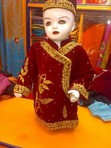The writer is what he is: A review of The world is what it is by Patrick French
The writer has laboured much to bring out the biography of a writer who has written autobiographical fiction besides his travel books all his life. Naipaul seem to have always lived a life of poverty, as given in this book too. He is often bailed out by BBC or other British institution when he was about to sink financially, once he is out of Oxford. Spendthrift and whore-monger, he is in trouble perpetually. So he worked in close association with British establishment, it also seems.
Very often he meets good Samaritans in Britain or elsewhere, who pay him in advance to write about Argentine, just before the Falkland war; for an example. And he finds all the connections there to guide him besides a free accommodation and a lover as well. And he does a kind of writing which rubbishes every place he goes to and celebrates the Britain and British.
The Sepoy mutiny of India, which terrorised colonials for nearly a century until they left India in 1947, as noted by E M Forster in 1917 in “A PASSAGE TO INDIA'; Naipaul describes as the proof of British resistance.
In the Islamic journeys he became more notorious to see a war of religion in the days coming. It was a time when USSR troops occupied Afghanistan and CIA was building Mujjahiddins to fight them and Iranian revolution has taken place. The clash of civilization and settling the score of history is an old theme. The British establishment wanted that kind of books from him at that time. And he wrote what was expected of him. Now the world is only blaming Tony Blair for the war against terrorism which is going wrong and which is looking to escalate by the day.
What is really astonishing is, never in this book, Patrick French questions the motives of Naipaul to do this kind of writing after beginning with an innocuous book like Miguel street. Also, he celebrates the Booker prize ‘In a free state’ won, which is a collection of very ordinary stories, later rejected by all the British editors who read it without the name of Naipaul and its title. But questioning the genius of Naipaul might bring the question about writing his biography as well.
So Naipaul, with his average talent and much ambition, played into the hands of the vested interests.
His writing was not appreciated much by wider audience except for his earliest work. But he found a strong supporter in the British establishment and went on to write the things which see a clash of civilization and a larger war. Time and again Naipaul has felt exasperation for not having become enough British in his work. Paul Theroux mentions him calling the Dutch ‘the potato eaters’.
Understandably, writing life is hard and penurious. And Naipaul minds rendering any other service besides producing words. This is a great weakness in a writer, for it spares him or her the banality of daily life and taking part in activities of the life which reveals a great deal about the people and the society. Without knowing them first hand, and writing out of rage and anger will produce a work which tries to contemplate a war of civilization. Also it calls for financial troubles, which will cripple the independence of the work.
His British wife works hard to make connection with upper class British people, who will bail out them often. So a very unlikely literary career becomes viable.
Naipaul says he is a man of the new world. He has no clue of the rise of China, however, anywhere in his work, which has over taken the USA as the largest economy of the world. And Nobel Academy mentioned his ‘prophetic journalism’ to award him with one. So the failings are multiple, of Naipaul and the world.
A writer is what he is; the world is ever shifting, therefore.
The World Is What It Is: The Authorized Biography of V.S. Naipaul





